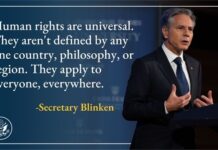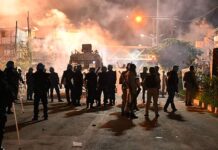
Anu Muhammad : If we look at our history of elections, we will find that they have always been a cause for celebration in the country. Election day used to be the one day when ordinary citizens, who on usual days would feel powerless, would hold some form of power as they exercised their right to vote. Bangladesh’s election used to be an occasion for celebrating individual empowerment within the conscious mass, fostering increased communication among diverse groups. The vibrant atmosphere, shaped by electoral campaigns and candidates from different parties seeking votes, truly created a festive ambiance.
This doesn’t necessarily mean that the past elections were perfect by any means—money, criminal activities, intimidation, etc were always issues that took the spotlight during the polls. Regardless of such flaws, whenever there was a participatory election, it was an event that evoked enthusiasm within every voting citizen in the country.
However, in recent elections—starting from 2014, then 2018, and now 2024—that excitement and enthusiasm have seen a notable decline. Those who became voters during these elections have not experienced the festive atmosphere that should accompany national elections. Presently, in many parts of the country, a curfew-like state prevails, resembling a strike or blockade. While small groups of the Awami League supporters gather at certain centres, the expected level of participation and enthusiasm is notably absent everywhere. The understanding that the current ruling party will remain in power is widespread. By holding such elections, they have effectively undermined the idea of elections as a system, the Election Commission as an organisation, and democracy as an ideology.
Through the January 7 election, the Awami League is all set to assume power again, but will they be true representatives of the public? Instead, they may become a coercive entity, signalling a renewal of authoritarian governance. Alternatively, this can be perceived as an attempt to solidify the party’s grip on power into a more permanent settlement. What do ordinary citizens gain from this, and what can they expect?
Through this contrived election, the prevailing situation will further intensify. Existing institutions, which are already not functioning as they should, will cease to operate in the true sense. Looking ahead, this trend may take an even more extreme turn. Notably, institutions such as the Election Commission, the National Human Rights Commission, the judiciary, and the universities, which hold substantial influence on society, operate through invisible directives. This election will exacerbate this process. The current centralised system, predominantly controlled by the one percent, will solidify into an absolute state, leading to increased inequality and the centralisation of wealth. The root cause of heightened inequality in Bangladesh lies in the absence of accountability and transparency.
The influential and powerful people have been grabbing lands, rivers and hills. They have been undertaking highly expensive projects through the government. You cannot charge $100 million for a project that’s supposed to cost $1 million only, when there is a democratic process in place, when there is accountability and transparency in place. Because there is no such oversight, this country has seen a multifold increase in overpriced projects. The beneficiaries of these projects are some small percentage of business groups. This group of businessmen drew up different kinds of contracts and agreements that afforded them benefits, enabling them to become extremely wealthy within a short period. This election increased their opportunity to do so even more. Our process of keeping them accountable will become even weaker.
It is evident that ethnic and religious minorities in Bangladesh find themselves in a difficult state. Their lands and hills are being forcibly seized, resulting in some to leave their own country due to fear. These reprehensible activities may escalate in the future, as the same political party that enabled or indirectly performed these actions consolidates its power, making it ever present.
We are aware of how the draconian Digital Security Act (DSA) was employed by the government as the primary tool to suppress the dissenting voices in Bangladesh. Teachers, students, journalists, singers, artists, politicians, and various other groups became targets of the DSA, facing imprisonment and, in some instances, even death while in police custody. The DSA has subsequently been rebranded as the Cyber Security Act (CSA), drawing substantial criticism within the country. Post Bangladesh’s election on January 7, the critique of such laws is anticipated to significantly diminish.
Students in public universities find themselves in a state of helplessness, enduring regular torture and humiliation by Bangladesh Chhatra League (BCL). The lack of intervention by university administrators, who themselves are often blind supporters of the government, implies that the situation in these universities, especially in residential halls, is poised to worsen.
Some megaprojects in Bangladesh, which are more aptly described as mega-disasters—such as Rampal Power Plant or Rooppur Nuclear Power Plant—have only thrived because of the lack of accountability. As the ruling party successfully ensures the renewal of its authoritarian rule, these anti-climate, anti-people projects are expected to proliferate. They may heighten climate disasters, exacerbate people’s sufferings, escalate inequality and discrimination even more, and push Bangladesh to rely more on international loans. The country will be held hostage for the benefit of a few.
In recent years, major global powers like the US, China, India and Russia have displayed heightened interest in Bangladesh’s politics. Despite their public discourse on democracy and human rights in our country, their internal motivations for their own benefits remain paramount. The current government is unlikely to leave any of these countries’ agendas unfulfilled—except for the democratic and human rights agenda. Consequently, Bangladesh may find itself compelled to meet these countries’ demands, making sacrifices in the process.
The only escape from this dire situation lies within ourselves, particularly the youth. It is our responsibility to reintroduce the lost vision of a democratic, secular, and humane nation. We must actively bring this vision to the forefront, fostering belief in the possibility of a socially inclusive and tolerant nation, thereby potentially reversing our country’s downward spiral.
Although Bangladesh’s election on January 7 was conducted in the name of constitutional continuity, its dramatised and predicted nature has fortified the ruling class and the superrich. Public insecurity and helplessness have surged in tandem. Despite the ruling party’s rhetoric about the spirit of the Liberation War, its actions contradict this narrative. Inequality, concentration of power, continuous repression, and the erosion of democracy are all antithetical to that spirit. I believe that a clearer vision among the public, emphasising the true spirit of liberation, will generate resistance from within us and the youth.
Anu Muhammad is former professor of economics at Jahangirnagar University.









